Avengers Ltd Business Law Case Study: Directors' Responsibilities
VerifiedAdded on 2022/10/04
|7
|1157
|273
Case Study
AI Summary
This case study examines the legal issues arising within Avengers Ltd, focusing on the conduct of its directors, particularly Captin and Ironman. The assignment utilizes the ILAC structure (Issue, Law, Application, Conclusion) to analyze two primary issues: whether Captin breached his duty of care under the Corporations Act by rejecting funding for a software prototype and whether Ironman breached conflict of interest provisions by using his own funds to develop the prototype and subsequently taking the software with him upon resigning. The analysis incorporates relevant case law, including ASIC v Flugge, Greenhalgh v Arderne Cinemas, Cook v Deeks, and Canadian Aero Service Ltd v O'Malley, to determine the directors' responsibilities and potential breaches. The conclusion finds that both Captin and Ironman likely breached their respective duties, highlighting the importance of due diligence, acting in the best interests of the company, and disclosing conflicts of interest.
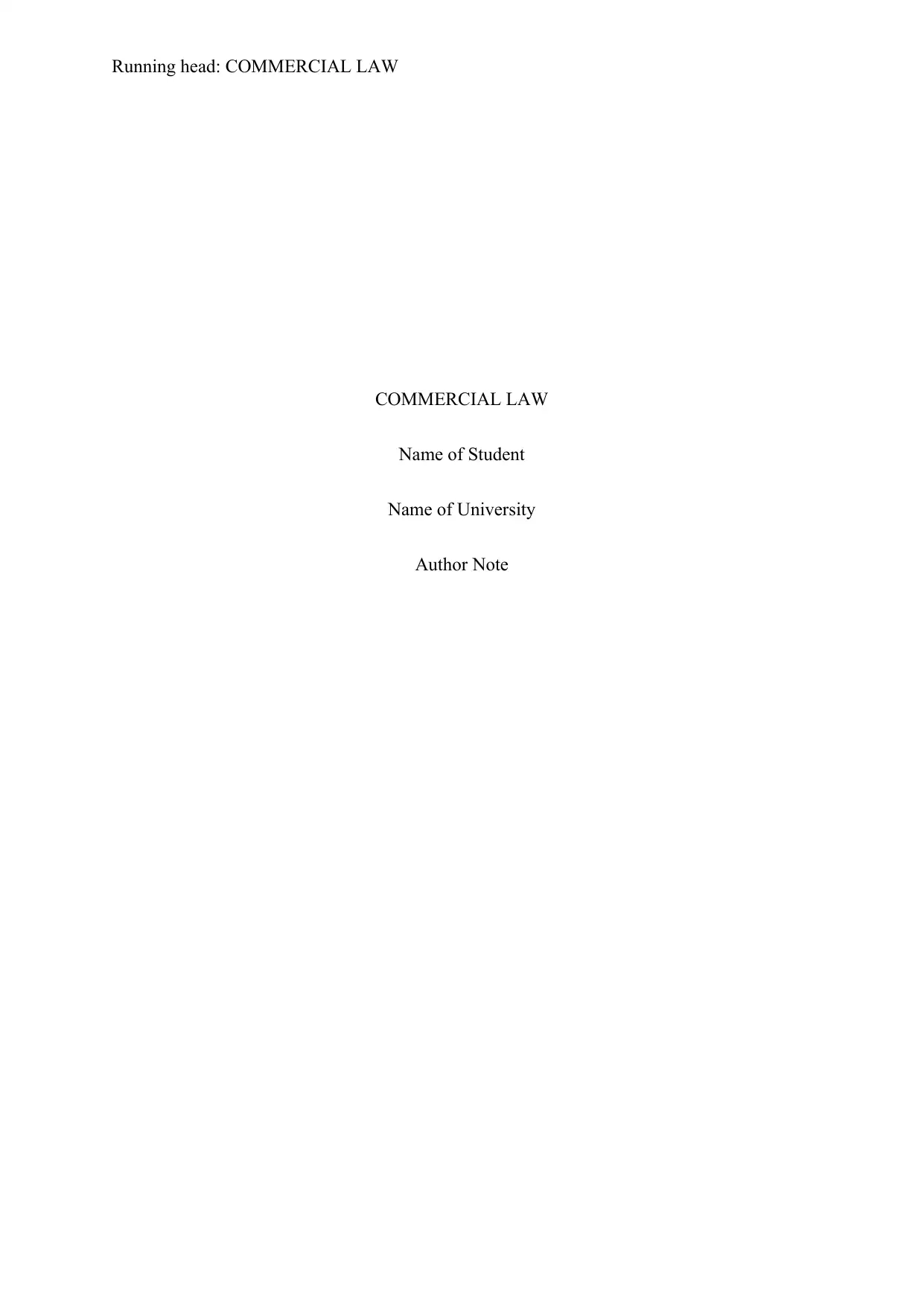
Running head: COMMERCIAL LAW
COMMERCIAL LAW
Name of Student
Name of University
Author Note
COMMERCIAL LAW
Name of Student
Name of University
Author Note
Paraphrase This Document
Need a fresh take? Get an instant paraphrase of this document with our AI Paraphraser
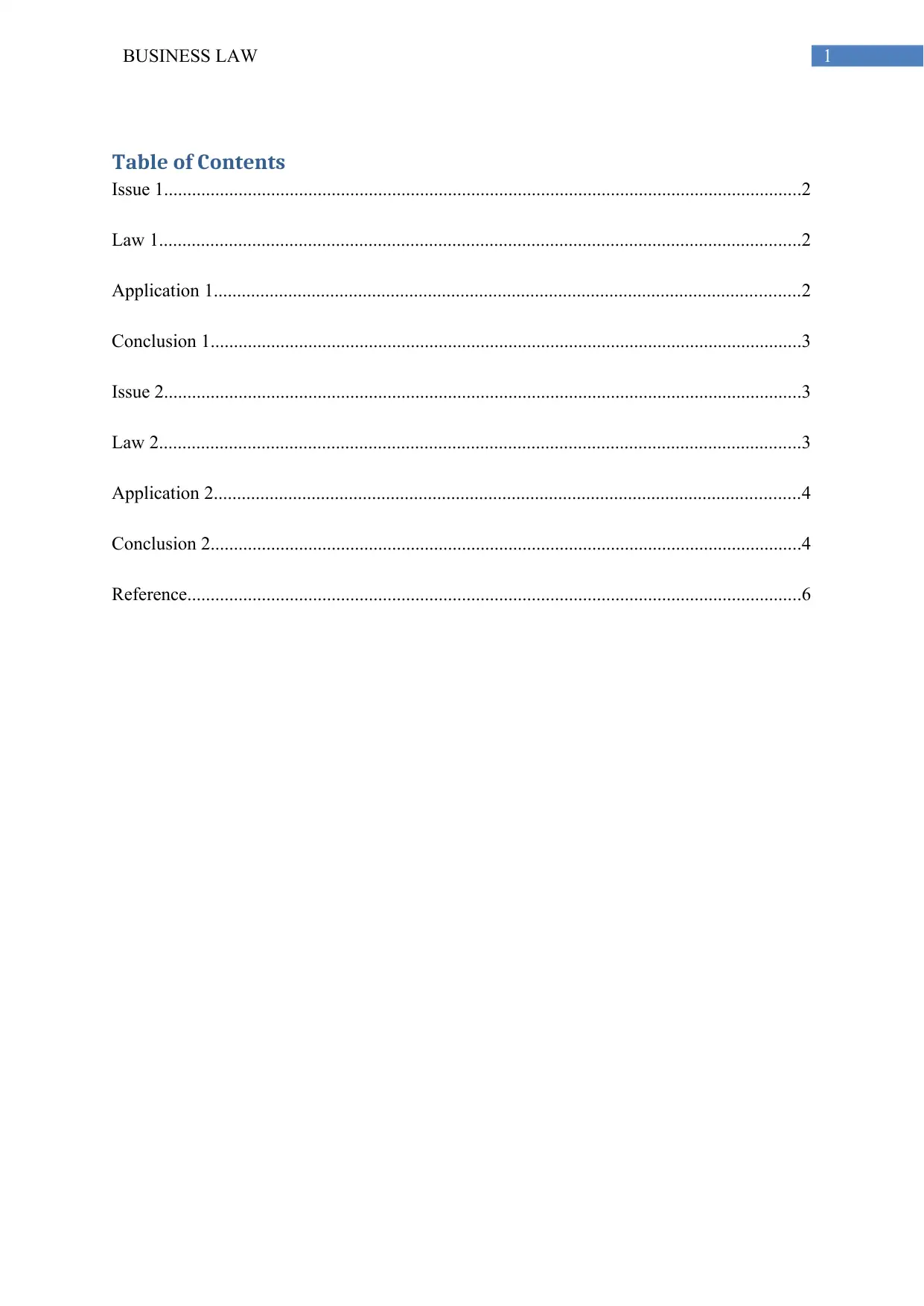
1BUSINESS LAW
Table of Contents
Issue 1.........................................................................................................................................2
Law 1..........................................................................................................................................2
Application 1..............................................................................................................................2
Conclusion 1...............................................................................................................................3
Issue 2.........................................................................................................................................3
Law 2..........................................................................................................................................3
Application 2..............................................................................................................................4
Conclusion 2...............................................................................................................................4
Reference....................................................................................................................................6
Table of Contents
Issue 1.........................................................................................................................................2
Law 1..........................................................................................................................................2
Application 1..............................................................................................................................2
Conclusion 1...............................................................................................................................3
Issue 2.........................................................................................................................................3
Law 2..........................................................................................................................................3
Application 2..............................................................................................................................4
Conclusion 2...............................................................................................................................4
Reference....................................................................................................................................6
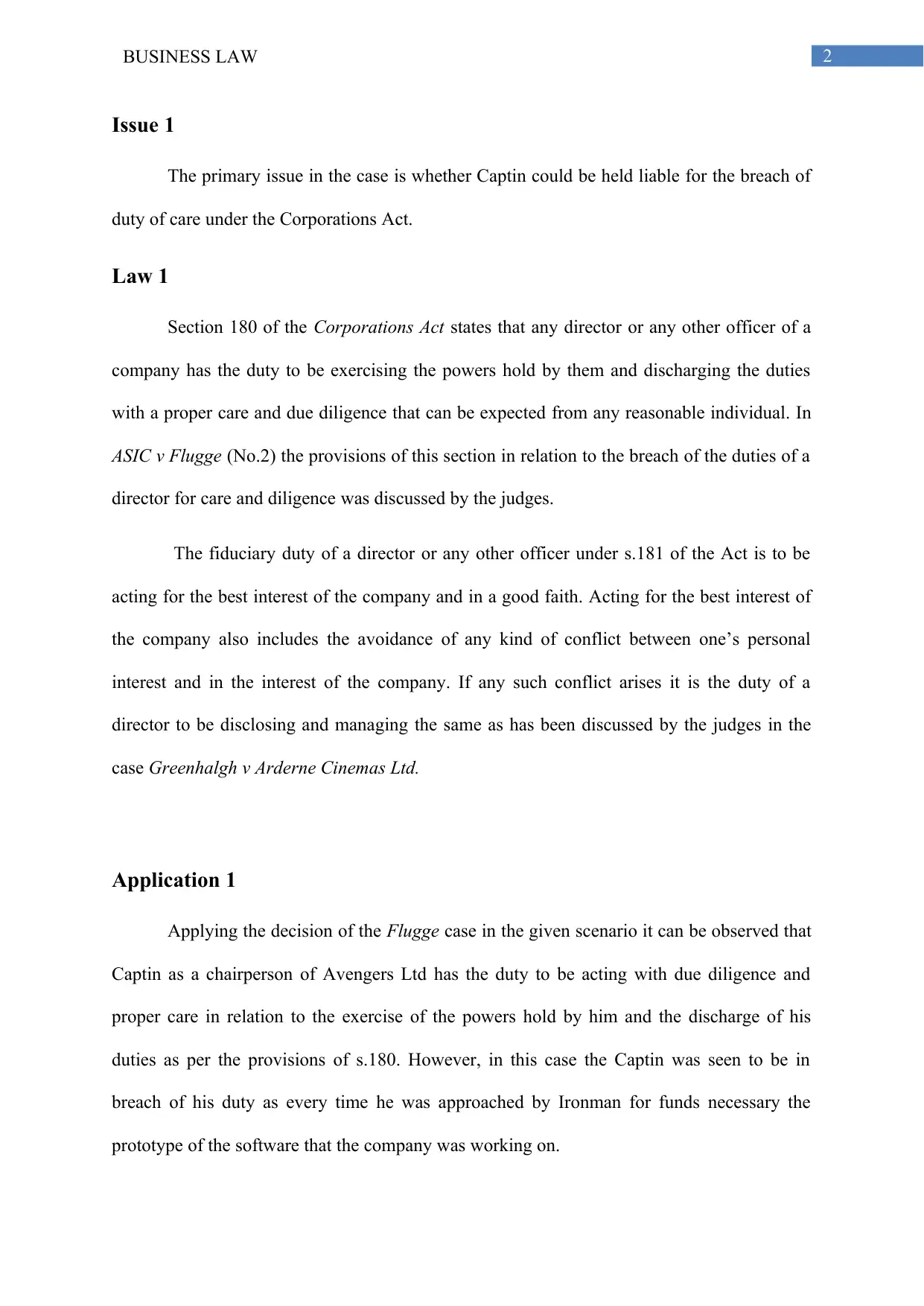
2BUSINESS LAW
Issue 1
The primary issue in the case is whether Captin could be held liable for the breach of
duty of care under the Corporations Act.
Law 1
Section 180 of the Corporations Act states that any director or any other officer of a
company has the duty to be exercising the powers hold by them and discharging the duties
with a proper care and due diligence that can be expected from any reasonable individual. In
ASIC v Flugge (No.2) the provisions of this section in relation to the breach of the duties of a
director for care and diligence was discussed by the judges.
The fiduciary duty of a director or any other officer under s.181 of the Act is to be
acting for the best interest of the company and in a good faith. Acting for the best interest of
the company also includes the avoidance of any kind of conflict between one’s personal
interest and in the interest of the company. If any such conflict arises it is the duty of a
director to be disclosing and managing the same as has been discussed by the judges in the
case Greenhalgh v Arderne Cinemas Ltd.
Application 1
Applying the decision of the Flugge case in the given scenario it can be observed that
Captin as a chairperson of Avengers Ltd has the duty to be acting with due diligence and
proper care in relation to the exercise of the powers hold by him and the discharge of his
duties as per the provisions of s.180. However, in this case the Captin was seen to be in
breach of his duty as every time he was approached by Ironman for funds necessary the
prototype of the software that the company was working on.
Issue 1
The primary issue in the case is whether Captin could be held liable for the breach of
duty of care under the Corporations Act.
Law 1
Section 180 of the Corporations Act states that any director or any other officer of a
company has the duty to be exercising the powers hold by them and discharging the duties
with a proper care and due diligence that can be expected from any reasonable individual. In
ASIC v Flugge (No.2) the provisions of this section in relation to the breach of the duties of a
director for care and diligence was discussed by the judges.
The fiduciary duty of a director or any other officer under s.181 of the Act is to be
acting for the best interest of the company and in a good faith. Acting for the best interest of
the company also includes the avoidance of any kind of conflict between one’s personal
interest and in the interest of the company. If any such conflict arises it is the duty of a
director to be disclosing and managing the same as has been discussed by the judges in the
case Greenhalgh v Arderne Cinemas Ltd.
Application 1
Applying the decision of the Flugge case in the given scenario it can be observed that
Captin as a chairperson of Avengers Ltd has the duty to be acting with due diligence and
proper care in relation to the exercise of the powers hold by him and the discharge of his
duties as per the provisions of s.180. However, in this case the Captin was seen to be in
breach of his duty as every time he was approached by Ironman for funds necessary the
prototype of the software that the company was working on.
⊘ This is a preview!⊘
Do you want full access?
Subscribe today to unlock all pages.

Trusted by 1+ million students worldwide
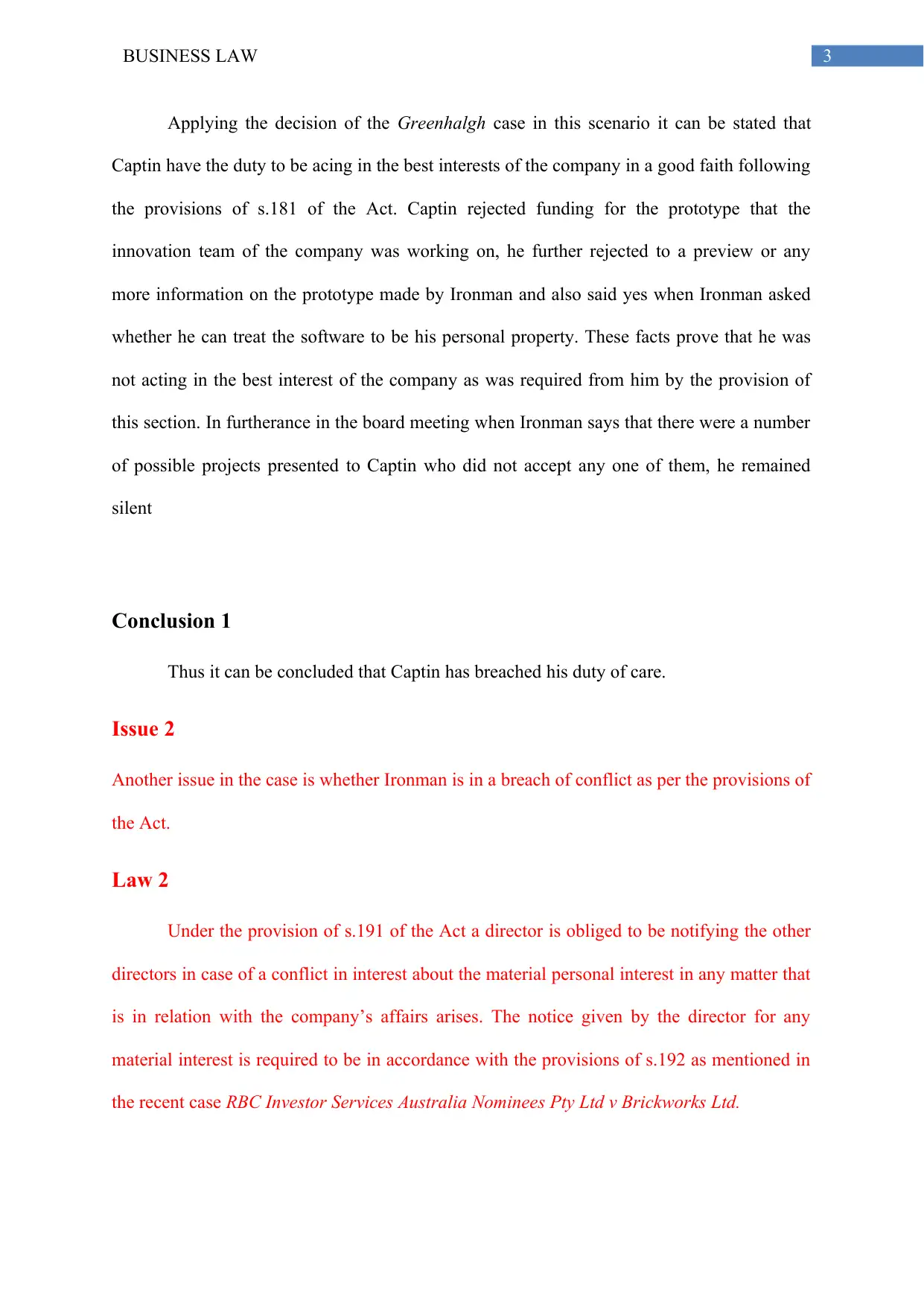
3BUSINESS LAW
Applying the decision of the Greenhalgh case in this scenario it can be stated that
Captin have the duty to be acing in the best interests of the company in a good faith following
the provisions of s.181 of the Act. Captin rejected funding for the prototype that the
innovation team of the company was working on, he further rejected to a preview or any
more information on the prototype made by Ironman and also said yes when Ironman asked
whether he can treat the software to be his personal property. These facts prove that he was
not acting in the best interest of the company as was required from him by the provision of
this section. In furtherance in the board meeting when Ironman says that there were a number
of possible projects presented to Captin who did not accept any one of them, he remained
silent
Conclusion 1
Thus it can be concluded that Captin has breached his duty of care.
Issue 2
Another issue in the case is whether Ironman is in a breach of conflict as per the provisions of
the Act.
Law 2
Under the provision of s.191 of the Act a director is obliged to be notifying the other
directors in case of a conflict in interest about the material personal interest in any matter that
is in relation with the company’s affairs arises. The notice given by the director for any
material interest is required to be in accordance with the provisions of s.192 as mentioned in
the recent case RBC Investor Services Australia Nominees Pty Ltd v Brickworks Ltd.
Applying the decision of the Greenhalgh case in this scenario it can be stated that
Captin have the duty to be acing in the best interests of the company in a good faith following
the provisions of s.181 of the Act. Captin rejected funding for the prototype that the
innovation team of the company was working on, he further rejected to a preview or any
more information on the prototype made by Ironman and also said yes when Ironman asked
whether he can treat the software to be his personal property. These facts prove that he was
not acting in the best interest of the company as was required from him by the provision of
this section. In furtherance in the board meeting when Ironman says that there were a number
of possible projects presented to Captin who did not accept any one of them, he remained
silent
Conclusion 1
Thus it can be concluded that Captin has breached his duty of care.
Issue 2
Another issue in the case is whether Ironman is in a breach of conflict as per the provisions of
the Act.
Law 2
Under the provision of s.191 of the Act a director is obliged to be notifying the other
directors in case of a conflict in interest about the material personal interest in any matter that
is in relation with the company’s affairs arises. The notice given by the director for any
material interest is required to be in accordance with the provisions of s.192 as mentioned in
the recent case RBC Investor Services Australia Nominees Pty Ltd v Brickworks Ltd.
Paraphrase This Document
Need a fresh take? Get an instant paraphrase of this document with our AI Paraphraser
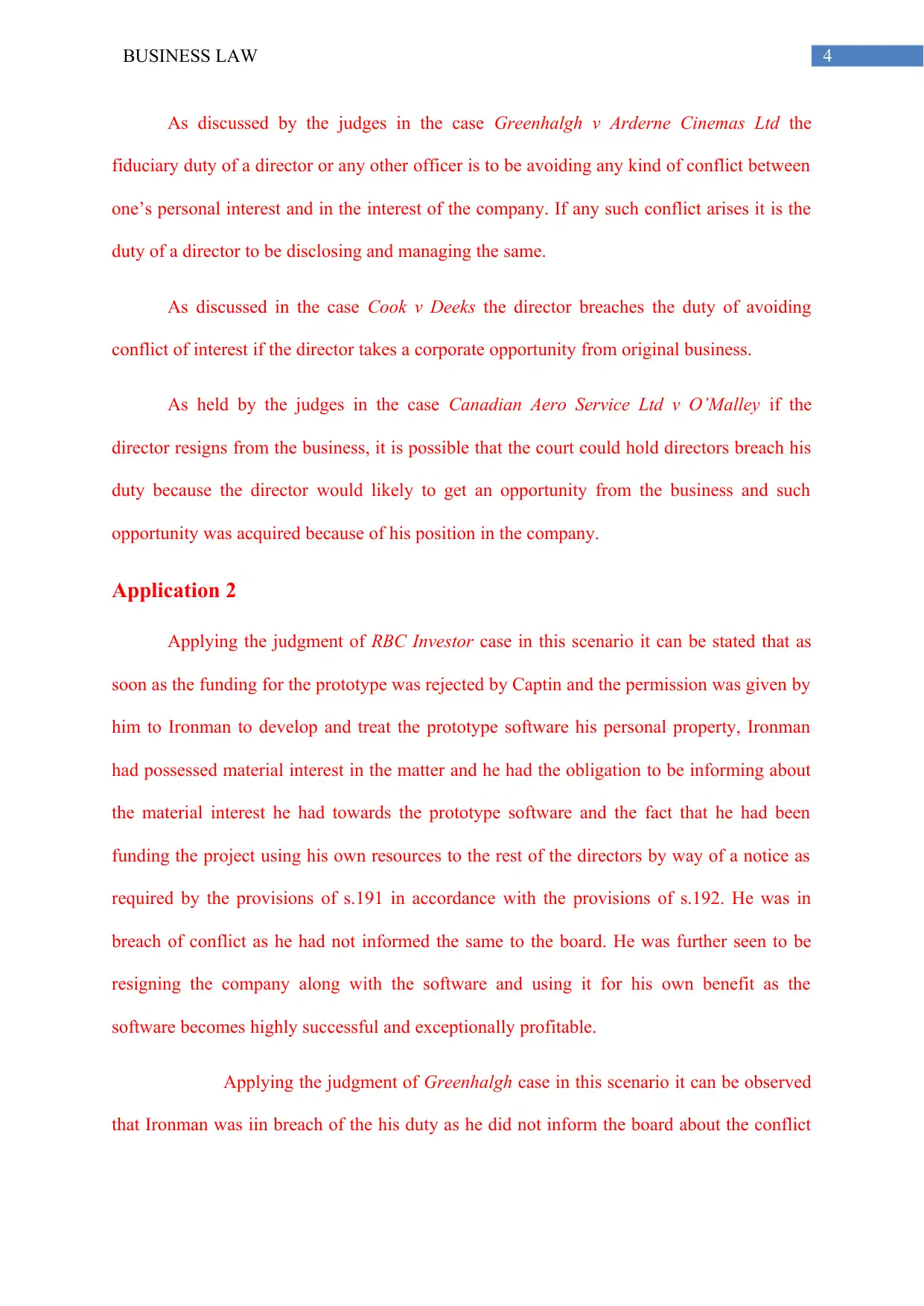
4BUSINESS LAW
As discussed by the judges in the case Greenhalgh v Arderne Cinemas Ltd the
fiduciary duty of a director or any other officer is to be avoiding any kind of conflict between
one’s personal interest and in the interest of the company. If any such conflict arises it is the
duty of a director to be disclosing and managing the same.
As discussed in the case Cook v Deeks the director breaches the duty of avoiding
conflict of interest if the director takes a corporate opportunity from original business.
As held by the judges in the case Canadian Aero Service Ltd v O’Malley if the
director resigns from the business, it is possible that the court could hold directors breach his
duty because the director would likely to get an opportunity from the business and such
opportunity was acquired because of his position in the company.
Application 2
Applying the judgment of RBC Investor case in this scenario it can be stated that as
soon as the funding for the prototype was rejected by Captin and the permission was given by
him to Ironman to develop and treat the prototype software his personal property, Ironman
had possessed material interest in the matter and he had the obligation to be informing about
the material interest he had towards the prototype software and the fact that he had been
funding the project using his own resources to the rest of the directors by way of a notice as
required by the provisions of s.191 in accordance with the provisions of s.192. He was in
breach of conflict as he had not informed the same to the board. He was further seen to be
resigning the company along with the software and using it for his own benefit as the
software becomes highly successful and exceptionally profitable.
Applying the judgment of Greenhalgh case in this scenario it can be observed
that Ironman was iin breach of the his duty as he did not inform the board about the conflict
As discussed by the judges in the case Greenhalgh v Arderne Cinemas Ltd the
fiduciary duty of a director or any other officer is to be avoiding any kind of conflict between
one’s personal interest and in the interest of the company. If any such conflict arises it is the
duty of a director to be disclosing and managing the same.
As discussed in the case Cook v Deeks the director breaches the duty of avoiding
conflict of interest if the director takes a corporate opportunity from original business.
As held by the judges in the case Canadian Aero Service Ltd v O’Malley if the
director resigns from the business, it is possible that the court could hold directors breach his
duty because the director would likely to get an opportunity from the business and such
opportunity was acquired because of his position in the company.
Application 2
Applying the judgment of RBC Investor case in this scenario it can be stated that as
soon as the funding for the prototype was rejected by Captin and the permission was given by
him to Ironman to develop and treat the prototype software his personal property, Ironman
had possessed material interest in the matter and he had the obligation to be informing about
the material interest he had towards the prototype software and the fact that he had been
funding the project using his own resources to the rest of the directors by way of a notice as
required by the provisions of s.191 in accordance with the provisions of s.192. He was in
breach of conflict as he had not informed the same to the board. He was further seen to be
resigning the company along with the software and using it for his own benefit as the
software becomes highly successful and exceptionally profitable.
Applying the judgment of Greenhalgh case in this scenario it can be observed
that Ironman was iin breach of the his duty as he did not inform the board about the conflict
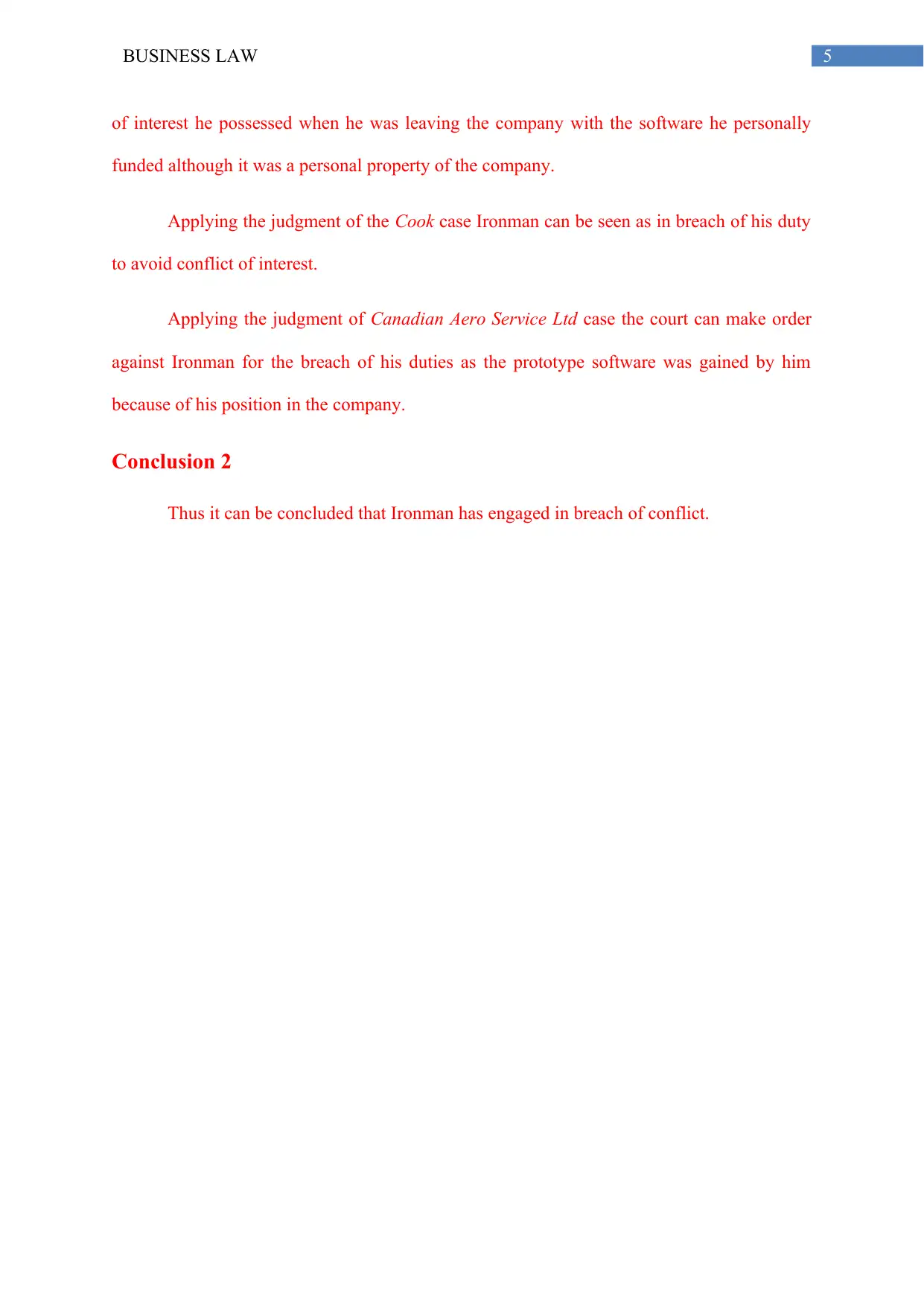
5BUSINESS LAW
of interest he possessed when he was leaving the company with the software he personally
funded although it was a personal property of the company.
Applying the judgment of the Cook case Ironman can be seen as in breach of his duty
to avoid conflict of interest.
Applying the judgment of Canadian Aero Service Ltd case the court can make order
against Ironman for the breach of his duties as the prototype software was gained by him
because of his position in the company.
Conclusion 2
Thus it can be concluded that Ironman has engaged in breach of conflict.
of interest he possessed when he was leaving the company with the software he personally
funded although it was a personal property of the company.
Applying the judgment of the Cook case Ironman can be seen as in breach of his duty
to avoid conflict of interest.
Applying the judgment of Canadian Aero Service Ltd case the court can make order
against Ironman for the breach of his duties as the prototype software was gained by him
because of his position in the company.
Conclusion 2
Thus it can be concluded that Ironman has engaged in breach of conflict.
⊘ This is a preview!⊘
Do you want full access?
Subscribe today to unlock all pages.

Trusted by 1+ million students worldwide
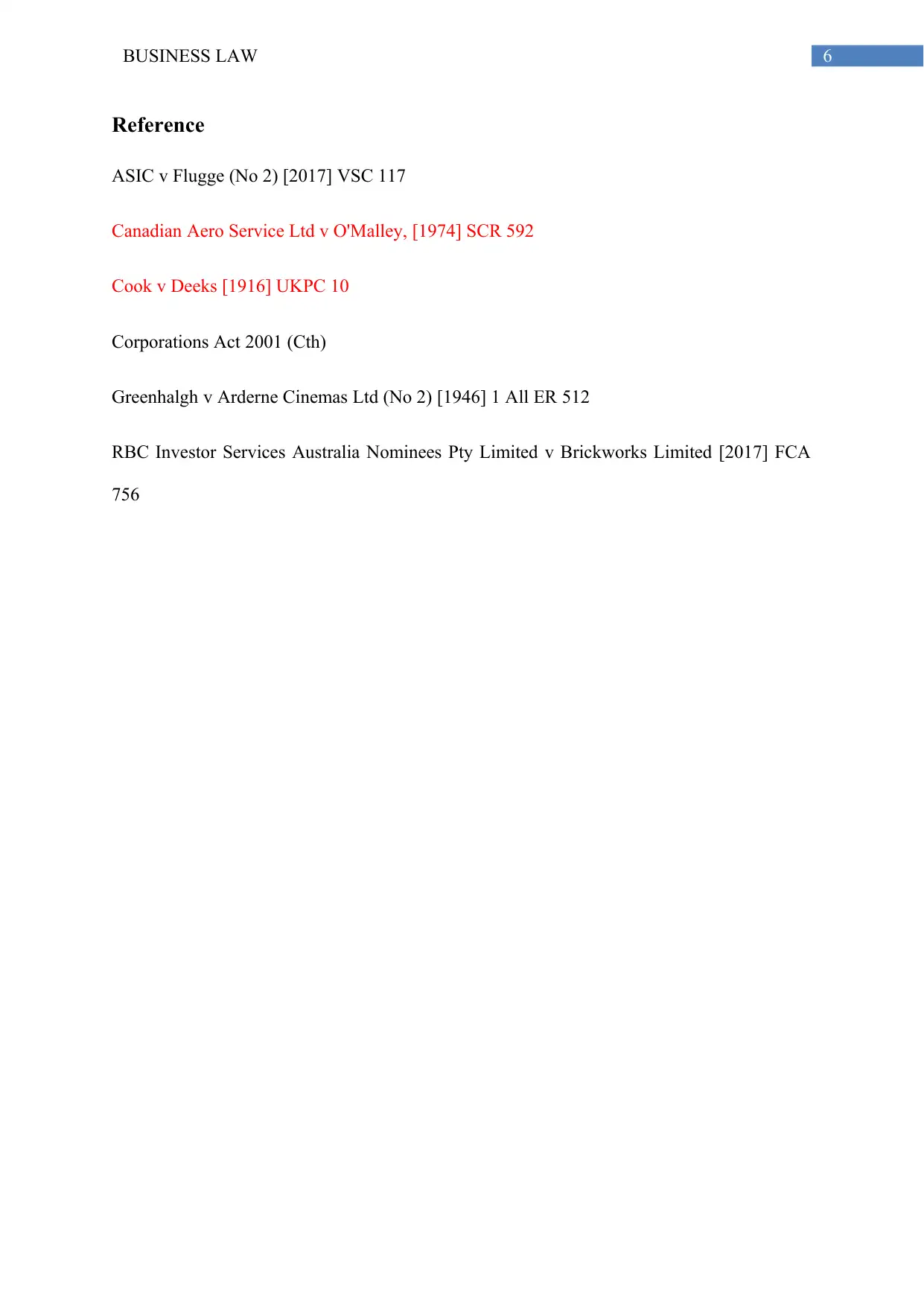
6BUSINESS LAW
Reference
ASIC v Flugge (No 2) [2017] VSC 117
Canadian Aero Service Ltd v O'Malley, [1974] SCR 592
Cook v Deeks [1916] UKPC 10
Corporations Act 2001 (Cth)
Greenhalgh v Arderne Cinemas Ltd (No 2) [1946] 1 All ER 512
RBC Investor Services Australia Nominees Pty Limited v Brickworks Limited [2017] FCA
756
Reference
ASIC v Flugge (No 2) [2017] VSC 117
Canadian Aero Service Ltd v O'Malley, [1974] SCR 592
Cook v Deeks [1916] UKPC 10
Corporations Act 2001 (Cth)
Greenhalgh v Arderne Cinemas Ltd (No 2) [1946] 1 All ER 512
RBC Investor Services Australia Nominees Pty Limited v Brickworks Limited [2017] FCA
756
1 out of 7
Related Documents
Your All-in-One AI-Powered Toolkit for Academic Success.
+13062052269
info@desklib.com
Available 24*7 on WhatsApp / Email
![[object Object]](/_next/static/media/star-bottom.7253800d.svg)
Unlock your academic potential
Copyright © 2020–2025 A2Z Services. All Rights Reserved. Developed and managed by ZUCOL.




![Detailed Analysis of the ASIC v Flugge (No 2) [2017] VSC 117 Case](/_next/image/?url=https%3A%2F%2Fdesklib.com%2Fmedia%2Fimages%2Fmt%2Fec4e36a8265a4eb19a3349d48f208406.jpg&w=256&q=75)
